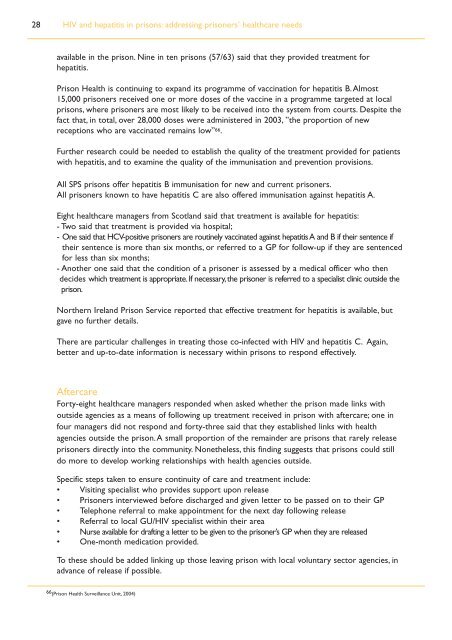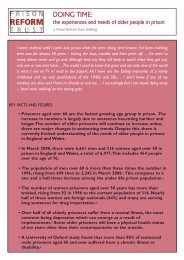HIV and Hepatitis in UK Prisons - Prison Reform Trust
HIV and Hepatitis in UK Prisons - Prison Reform Trust
HIV and Hepatitis in UK Prisons - Prison Reform Trust
Create successful ePaper yourself
Turn your PDF publications into a flip-book with our unique Google optimized e-Paper software.
28 <strong>HIV</strong> <strong>and</strong> hepatitis <strong>in</strong> prisons: address<strong>in</strong>g prisoners’ healthcare needs<br />
available <strong>in</strong> the prison. N<strong>in</strong>e <strong>in</strong> ten prisons (57/63) said that they provided treatment for<br />
hepatitis.<br />
<strong>Prison</strong> Health is cont<strong>in</strong>u<strong>in</strong>g to exp<strong>and</strong> its programme of vacc<strong>in</strong>ation for hepatitis B.Almost<br />
15,000 prisoners received one or more doses of the vacc<strong>in</strong>e <strong>in</strong> a programme targeted at local<br />
prisons, where prisoners are most likely to be received <strong>in</strong>to the system from courts. Despite the<br />
fact that, <strong>in</strong> total, over 28,000 doses were adm<strong>in</strong>istered <strong>in</strong> 2003, ”the proportion of new<br />
receptions who are vacc<strong>in</strong>ated rema<strong>in</strong>s low” 66 .<br />
Further research could be needed to establish the quality of the treatment provided for patients<br />
with hepatitis, <strong>and</strong> to exam<strong>in</strong>e the quality of the immunisation <strong>and</strong> prevention provisions.<br />
All SPS prisons offer hepatitis B immunisation for new <strong>and</strong> current prisoners.<br />
All prisoners known to have hepatitis C are also offered immunisation aga<strong>in</strong>st hepatitis A.<br />
Eight healthcare managers from Scotl<strong>and</strong> said that treatment is available for hepatitis:<br />
- Two said that treatment is provided via hospital;<br />
- One said that HCV-positive prisoners are rout<strong>in</strong>ely vacc<strong>in</strong>ated aga<strong>in</strong>st hepatitis A <strong>and</strong> B if their sentence if<br />
their sentence is more than six months, or referred to a GP for follow-up if they are sentenced<br />
for less than six months;<br />
- Another one said that the condition of a prisoner is assessed by a medical officer who then<br />
decides which treatment is appropriate. If necessary, the prisoner is referred to a specialist cl<strong>in</strong>ic outside the<br />
prison.<br />
Northern Irel<strong>and</strong> <strong>Prison</strong> Service reported that effective treatment for hepatitis is available, but<br />
gave no further details.<br />
There are particular challenges <strong>in</strong> treat<strong>in</strong>g those co-<strong>in</strong>fected with <strong>HIV</strong> <strong>and</strong> hepatitis C. Aga<strong>in</strong>,<br />
better <strong>and</strong> up-to-date <strong>in</strong>formation is necessary with<strong>in</strong> prisons to respond effectively.<br />
Aftercare<br />
Forty-eight healthcare managers responded when asked whether the prison made l<strong>in</strong>ks with<br />
outside agencies as a means of follow<strong>in</strong>g up treatment received <strong>in</strong> prison with aftercare; one <strong>in</strong><br />
four managers did not respond <strong>and</strong> forty-three said that they established l<strong>in</strong>ks with health<br />
agencies outside the prison.A small proportion of the rema<strong>in</strong>der are prisons that rarely release<br />
prisoners directly <strong>in</strong>to the community. Nonetheless, this f<strong>in</strong>d<strong>in</strong>g suggests that prisons could still<br />
do more to develop work<strong>in</strong>g relationships with health agencies outside.<br />
Specific steps taken to ensure cont<strong>in</strong>uity of care <strong>and</strong> treatment <strong>in</strong>clude:<br />
• Visit<strong>in</strong>g specialist who provides support upon release<br />
• <strong>Prison</strong>ers <strong>in</strong>terviewed before discharged <strong>and</strong> given letter to be passed on to their GP<br />
• Telephone referral to make appo<strong>in</strong>tment for the next day follow<strong>in</strong>g release<br />
• Referral to local GU/<strong>HIV</strong> specialist with<strong>in</strong> their area<br />
• Nurse available for draft<strong>in</strong>g a letter to be given to the prisoner’s GP when they are released<br />
• One-month medication provided.<br />
To these should be added l<strong>in</strong>k<strong>in</strong>g up those leav<strong>in</strong>g prison with local voluntary sector agencies, <strong>in</strong><br />
advance of release if possible.<br />
66 (<strong>Prison</strong> Health Surveillance Unit, 2004)

















